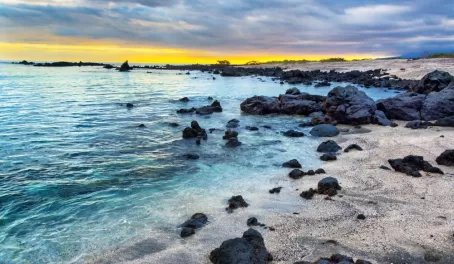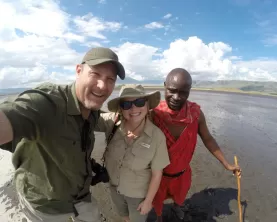A Father and Son Odyssey
My adventure started out as somewhat of a mid-life vision quest, something I was going to do solo, taking me far away from home and work. However, it eventually grew into a father/ son bonding experience that neither my son (Zach) nor I would ever forget. When we began planning this trip, we decided that to make our time as rewarding as possible we needed to step away from the mainstream vacation stuff and focus on four things: ecology, cultures and people other than our own, giving something back to each of the afore mentioned, and of course, a fair amount of adventure.
We looked at a number of tour companies and possible locations including Peru and Costa Rica, but finally chose Adventure Life due to their personal touch and a sincere appreciation for global environmental concerns. Ecuador, with its diverse eco-system and beautiful rainforests, fit the bill as well. Additionally, we were looking for a way to make a difference and to help, if even in a small way, someone else along the way. So, with the help of Betty Ann Morgan (Adventure Life owner Brian Morgan's mother) and Betty Jarmillo-Zurita, our contact in Ecuador, we planned a visit to San Vicente de Paul Orphanage in Quito, Ecuador.
Although I have traveled quite a bit, this was the first trip outside of the United States I have ever taken alone with my son. I highly recommend this to any father or mother wishing to compete with video games, TV or any other distractions so common in our way of life; the experience can never be matched or be boiled down into words.
Our adventure started in Quito, the capital of Ecuador, high in the Andes Mountains. We spent the first few days just relaxing at the Hotel Sierra Madre, trying to get used to the altitude and touring the city. The Hotel Sierra Madre is a wonderfully charming old Spanish villa with outstanding views and a very attentive staff. Also, during the first few days we did some mountain biking on Mt. Cotopaxi, the highest active volcano in the world at over 15,000 feet; I don't recommend this to anyone with weak lungs.
The highlight of our first week came on the fourth day when Betty and her husband took us to San Vicente de Paul Orphanage. Unlike the United States, orphanages in Ecuador do not receive government subsidization of any kind and operate solely on the support of local churches and individual donations. Although clean and dry, the orphanage is in constant need of everything. With approximately 90+ children and so little to work with, it's not hard to imagine how hard it must be for the staff to maintain a loving, wholesome environment.
We arrived early and were met by the smiling faces of children happy to be held and loved by someone, anyone. These children are starved for affection and reassurance, while material things mean nothing to them (except to have a good pair of shoes or a soccer ball that stays inflated). We take so much for granted in our day-to-day lives; I learned as much from this lesson as did my son and it has forever changed my life. Prior to the trip, with some help from my wife, mother and one of my co-workers, we managed to gather enough school supplies, toiletries and books to fill two large duffel bags, the books provided by Owens Corning "A Raindrop's Journey" and "Green Meadows" were an absolute hit. These items were presented to the orphanage as a gift from all of us. I had no way of knowing how rewarding this gesture would be, I only wish I could have provided more…. more time, more love, more compassion. I found it very hard leaving the children that day, especially Andre, a little four-year-old boy who attached himself to me from the beginning and never let go. I would have taken him with me if I could have. I left with a newfound respect for the life and family we take for granted everyday.
The second part of our adventure focused on ecology and the rainforests of Ecuador. We started by visiting the Bellavista Cloudforest Reserve high in the Andes Mountains. Every day, thick gray clouds roll in, covering everything with a layer of mist, which in effect keeps the forest well irrigated and full of life. These forests produce much of the world's oxygen and are extremely important to maintain. Richard and Gloria, owner/managers of Bellavista, treated us like family from the first moment we arrived, until dropping us back in Quito after our visit. Bellavista was so relaxing and educational; I highly recommend it to anyone visiting Ecuador.
From Bellavista, we moved farther into the interior of Ecuador and deep into the rainforest of the Amazon Basin. Here we would spend the next week camping and kayaking on the Shiripuno River and visiting with the Huaorani, an endangered tribe of indigenous people who make their homes in the rainforest. The Huaorani, who number around 1,500 in population, were only first contacted in the late fifties and still remain extremely elusive. During this very adventurous week our guides Alfredo, Fabriso, Raoul, and Moi shared with us an experience that could never be matched.
Just getting to where we were to put our kayaks in, on the Shiripuno, was an adventure. It started with an hour flight to Coca, Ecuador, which can only be described as a wild west frontier town, teaming with oil workers and coffee farmers. From there we loaded our gear and kayaks onto a 4-wheel-drive van and drove two hours down a rocky creek bed the locals called a road, to the river where we boarded dugout canoes for another day and a half ride upstream…… If you know where "The Middle of Nowhere" is, this place would be 200 miles south of that.
Once at the river we met our guide Moi, one of the Huaorani leaders, and one of the most amazing people I have ever met. Moi was made famous by the book "Savages" written by Joe Kane. We were taken to Nenquepare, a village of approximately 65 Huaorani and the home of Moi's father and brother.
I could never begin to express how the Huaorani people touched my life. From our standards they have very little, making their lives as hunter-gatherers, needing nothing from the outside world to sustain their quality of life. What I learned was that though the Huaorani have little material possessions they have much more, a sense of community and family we can only strive to achieve. I watched as every member of the community looked after each other as their own. They played, hugged one another and laughed like children. As warriors, the Huaorani are among the fiercest. Oil workers, missionaries and other tribes still maintain a healthy respect for them. To this day, the only way into their territory is with a Huaorani approved outfitter and Huaorani guide. As guests of the Huaorani, we were granted a rare glimpse into a civilization that remains as close to our primal ancestors as few others on earth.
All in all, I would have to say that the time I spent with my son this summer was the best thing I ever did and will not soon be forgotten. I highly recommend to any parents feeling a distance growing between themselves and their children, spend some time completely removed from distractions, one on one with your child. The rewards of doing this will far outweigh the expense.
Want to Go?
country

Ecuador
continent















